
“With a new disaster occurring every week, we cannot afford to forget the importance including all relevant national and international parties in the process of humanitarian coordination.”
Linda Doull (WHO Global Health Cluster Coordinator) speaks about humanitarian coordination and changing need at the annual UK EMT Members’ Meeting in November 2019.
In November, UK-Med attended the annual UK Emergency Medical Team (UK EMT) Members’ Meeting in London alongside the Department for International Development (DFID), the Fire and Rescue Services (FRS), Humanity & Inclusion (HI), and Palladium. The day was comprised of workshop sessions exploring members’ experiences with the UK EMT programme and how it can develop in-line with the changing shape of humanitarian response.
Linda Doull, Global Health Cluster Coordinator at the World Health Organisation (WHO), appeared as the guest Key Note speaker. Linda, who has a nursing background, has worked in several humanitarian roles within the likes of Medecins Sans Frontieres (MSF) and Merlin. Since starting at the WHO in 2014, Linda has worked to develop coordination strategies in the humanitarian health sector.
Linda’s talk highlighted how the purpose of humanitarian action and the purpose of its coordination is to meet the needs of affected people by means that are safe, reliable, inclusive and respective of humanitarian principles. But this is a complicated task given the differing context of the needs. Political, social, environmental and economic factors all impact coordinating humanitarian response. To undertake this, Linda calls for a coordination approach underpinned by central tenets of Centrality of Protection, Principled Collective Action, Collective Action and Collective Responsibilities.
In 2018, over 200 million people were deemed in need of humanitarian assistance across 81 countries. More worryingly, 80.6 million of these people were based in just six countries. With figures this high, the need for mobilising collective responsibilities has never been so urgent.
Linda advocates for a cluster approach to humanitarian coordination. Clusters are activated when existing coordination mechanisms are overwhelmed or constrained in their ability to respond. A cluster approach is comprised of adequate capacity and predictable leadership in all sectors; accountability and partnership in all sectors which upholds humanitarian principles; more strategic responses; better prioritization of resources; and provides support to government-led response and coordination. When implemented into emergency medical response, working in this way will enable better quality patient care including referral chains, continuity of care, sharing resources, protection and standardised data.
The cluster approach emphases that coordination cannot happen in isolation; agencies and partners must work together with local actors to ensure the most successful outcome. With a new disaster occurring every week, we cannot afford to forget the importance of including all relevant national and international parties in the process of humanitarian coordination.






No Comments